|
Dolce far niente
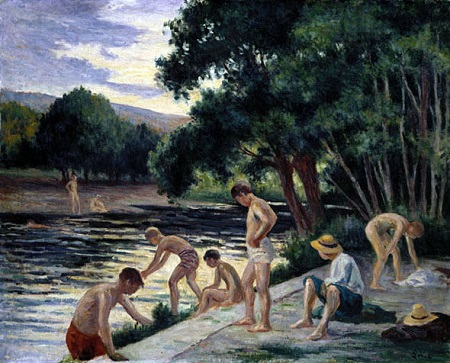
Baigneurs sur les rives de la Cure door Maximilien Luce, z.j.
Badelied
Auf Freunde, herunter das heiße Gewand
Und tauchet in kühlende Flut
Die Glieder, die matt von der Sonne gebrannt,
Und holet von neuem euch Mut.
Die Hitze erschlaffet, macht träge uns nur,
Nicht munter und tätig und frisch,
Doch Leben gibt uns und der ganzen Natur
Die Quelle im kühlen Gebüsch.
Vielleicht daß sich hier auch ein Mädchen gekühlt
Mit rosichten Wangen und Mund,
Am niedlichen Leibe dies Wellchen gespielt,
Am Busen so weiß und so rund.
Und welches Entzücken! dies Wellchen bespült
Auch meine entkleidete Brust.
O! wahrlich, wer diesen Gedanken nur fühlt,
Hat süße entzückende Lust.
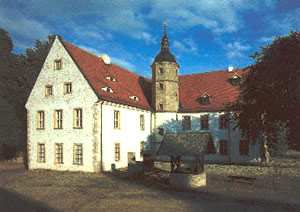
Novalis (2 mei 1772 - 25 maart 1801)
Schloss Oberwiederstedt, geboortehuis van Novalis
De Estische dichter, schrijver en vertaler Tõnu Õnnepalu werd geboren op 13 september 1962 in Tallin. Zie ook mijn blog van 13 september 2010 en eveneens alle tags voor Tõnu Õnnepalu op dit blog.
There is no freedom spring air
There is no freedom spring air
glowing and surging around us
on this festival of the last melting snow
when the alder catkins
are heavy with yellow dust
and the earth is heavy with water
and the eyes feel heavy wwith the beauty of light
when joy
comes and races
hands free down the hill
the lark falls through the air
when the sky
enfolds us into its perfect void
whose colours have no name
blue blue blue
a thousand times everything
with different meanings but
the dead grass and the earth
smell as for the first time in my life
and the pines
begin to rustle
when suddenly
an icy cold damp gust of wind from the sea
and the pinetops swaying in the sky
as if in the midst of a great sadness
for there is no freedom
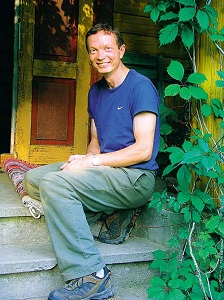
Tõnu Õnnepalu (Tallin, 13 september 1962)
De Britse schrijver Roald Dahl werd geboren op 13 september 1916 in Llandalf, Zuid-Wales. Dat is vandaag precies 100 jaar geleden. Zie ook mijn blog van 13 september 2010 en eveneens alle tags voor Roald Dahl op dit blog.
Uit: Boy
“My four friends and I had come across a loose floor-board at the back of the classroom, and when we prised it up with the blade of a pocket-knife, we discovered a big hollow space underneath. This, we decided, would be our secret hiding-place for sweets and other small treasures such as conkers and monkey-nuts and birds’ eggs. Every afternoon, when the last lesson was over, the five of us would wait until the classroom had emptied, then we would lift up the floor-board and examine our secret hoard, perhaps adding to it or taking something away.
One day, when we lifted it up, we found a dead mouse lying among our treasures. It was an exciting discovery. Thwaites took it out by its tail and waved it in front of our faces. ‘What shall we do with it?’ he cried.
‘It stinks!’ someone shouted. ‘Throw it out of the window quick!’
‘Hold on a tick,’ I said. ‘Don’t throw it away.’
Thwaites hesitated. They all looked at me.
When writing about oneself, one must strive to be truthful. Truth is more important than modesty. I must tell you, therefore, that it was I and I alone who had the idea for the great and daring Mouse Plot. We all have our moments of brilliance and glory, and this was mine.
‘Why don’t we,’ I said, ‘slip it into one of Mrs. Pratchett’s jars of sweets? Then when she puts her dirty hands into grab a handful, she’ll grab a stinky dead mouse instead.’
The other four stared at me in wonder. Then, as the sheer genius of the plot began to sink in, they all started grinning. They slapped me on the back. They cheered me and danced around the classroom. ‘We’ll do it today!’ they cried. ‘We’ll do it on the way home! You had the idea,’ they said to me, ‘so you can be the one to put the mouse in the jar.’
Thwaites handed me the mouse. I put it into my trouser pocket. Then the five of us left the school, crossed the village green and headed for the sweet-shop. We were tremendously jazzed up. We felt like a gang of desperados setting out to rob a train or blow up the sheriff’s office.
‘Make sure you put it into a jar that is used often,’ somebody said.
‘I’m putting it in Gobstoppers,’ I said. ‘The Gobstopper jar is never behind the counter.’
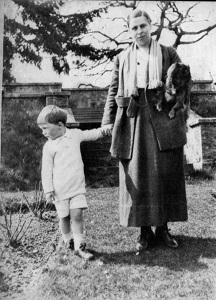
Roald Dahl (13 september 1916 – 23 november 1990)
Hier met zijn moeder in de tuin van hun huis in Ty Mynydd, circa 1919.
De Poolse schrijver Janusz Glowacki werd geboren op 13 september 1938 in Poznań. Zie ook mijn blog van 13 september 2010 en eveneens alle tags voor Janusz Glowacki op dit blog.
Uit: Good night, Jerzy (Vertaald door David Frick)
““oger nodded.
“Either way, we wish you success. Of course, a crowd of people will immediately gather to attack you, screaming that they knew him better, and that that wasn’t how it was at all. But that shouldn’t bother you, since you screwed first. But just don’t count on us. Because we aren’t all that certain there’s anyone left in New York, apart from us, who still remembers who Jerzy was in the first place.”
“Well, now you’re exaggerating,” I said.
Raul uncorked another bottle; the three cats joined the black one at our feet and formed a teeming mass of meowing and howling, scratching and biting. The orgy of the castrates was beginning.
The next day the weather turned bad, and it suddenly began to pour. Still, I went to Barnes & Noble, a huge bookstore of several stories on Broadway, across from Lincoln Center, and asked for a book on Kosiński.
“Who? Could you spell the name?” the young salesperson asked me.
I spelled it once, then once again, then again, but now through clenched teeth. He tapped on the computer keyboard, shook his head, and said:
“Nothing here.”
“Nothing?
“Nothing.
I sagged, was filled with doubt, and gave up on Jerzy.”

Janusz Glowacki (Poznań, 13 september 1938)
Hier op het strand in Chałupy met de schilderzusjes Wahl, 1970
De Nederlandse dichter, schrijver en schilder Jacobus (Jac) van Looy werd geboren in Haarlem op 13 september 1855. Zie ook alle tags voor Jac. van Looy op dit blog.
Slapeloos
Hij komt met geruisloze vleugelslag aan,
De donkerlokkige knaap,
Hij staart met zijn peinzende ogen mij aan,
De dromen-brengende Slaap.
Hij vouwt om mijn peluw zijn wieken wijd
Met loom gebogene lijn
En over mijn voorhoofd zijn adem verglijdt
In schaduw van maneschijn.
Dan aan mijn legerstee zet hij zich neer,
Het hoofd in de handen geleund,
En nokkende preevlend zuchten teer,
Hebben zijn lippen gekreund:
‘Gedreven van wereld-tot-wereldkust
Door de ogen der dagende Dag,
Ik voer met mij mede verdoving en rust
In eindeloos zelfbeklag.
Ach, waarom liet ik mijn broeder alleen,
Mijn tweelingbroeder de Dood,
Sluimeren wilde ik gaan tot hem heen,
Sluimeren zoet in zijn schoot.’
Zo weent hij en hult met wanhopig gebaar,
Met angstig vertrokkene mond,
Het vochte gelaat zich in 't ravenzwart haar,
Dat om zijn handen zich rondt.
Tot plotseling hij rijst, als door furiën gejaagd
Zie ik hem omziende staan,
Wijl diep in het Oosten de morgen daagt,
De ochtend in 't kleed van saffraan.
Als iemand die schrik overmande, hij staat,
Rillend van vleugelen licht,
Doch eer hij verruist en verder weer gaat,
Drukt hij de oogleên mij dicht.
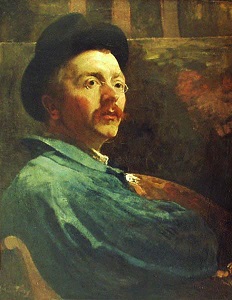
Jac. van Looy (13 september 1855 – 24 februari 1930)
Zelfportret met blauwe schilderskiel, 1896
De Nederlandse dichter, predikant en hoogleraarr Nicolaas Beets werd geboren op 13 september 1814 in Haarlem. Zie ook mijn blog van 13 september 2010 en eveneens alle tags voor Nicolaas Beets op dit blog.
Uit: Camera Obscura
“Het is December; zijn hout moet gehakt, en hij gaat rond met zijn opzichter, om te zeggen welke opgaande boomen aan de beurt liggen en welk hakhout het kapjaar heeft bereikt. Ook is de jacht nog niet gesloten, en hij laadt ‘groote zes’ op zijn geweer in plaats van ‘kleine’, want het haas heeft, zoowel als gij, zijn winterpels aan, en als hij tot den donker toe de 30 weitasch over den rechter- en den hagelzak over den linkerschouder gedragen heeft, en het overgehaald geweer in de hand, en een paar hazen en een paar houtsnippen voor zijn vrienden in de stad bovendien, dan eet hij als een wolf, en wèl zoo goed als gij, mijnheer, al gloeide uw kantoorkachel ook nog zoo, en al hebt
gij u ook nog zoo geanimeerd op de beurs. Des avonds is hij veel te moe om zich te vervelen; hij maakt zich gemakkelijk met kamerjapon en
pantoffels, en heeft het zeer druk over het haas, dat hij in ‘den
looper’ schoot en dat schreeuwde als een kind; het haas, dat hij vlak in
de ‘kamer’ schoot, en morsdood lag; en het haas, daar hij ‘de wol’
heeft zien afstuiven, dat ook werkelijk over den ‘bol’ buitelde, maar
toen de beenen weer opnam, om hier of daar in een verborgen hoek te gaan
liggen sterven; of wel, met het wagen van gissingen, waar dat haas mag
zijn gaan ‘drukken’, dat hij in de wijdte opgaan zag, en waar de snippen
mogen zijn neergevallen, daar zijn geweer op geketst heeft.”
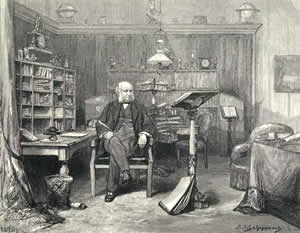
Nicolaas Beets (13 september 1814 – 13 maart 1903)
Beets in zijn studeervertrek. Tekening door P. A. Schipperus, 1885
De Oostenrijkse dichteres en schrijfster Marie Freifrau von Ebner-Eschenbach werd geboren op slot Zdislavice bij Kroměří¸ in Moravië op 13 september 1830. Zie ook alle tags voor Marie von Ebner-Eschenbach op dit blog.
Sommermorgen
Auf Bergeshöhen schneebedeckt,
Auf grünen Hügeln weitgestreckt
Erglänzt die Morgensonne;
Die tauerfrischten Zweige hebt
Der junge Buchenwald und bebt
Und bebt in Daseinswonne.
Es stürzt in ungestümer Lust
Herab aus dunkler Felsenbrust
Der Gießbach mit Getose,
Und blühend Leben weckt sein Hauch
Im stolzen Baum, im niedren Strauch,
In jedem zarten Moose.
Und drüben wo die Wiese liegt,
Im Blütenschmuck, da schwirrt und fliegt
Der Mücken Schwarm und Immen.
Wie sich's im hohen Grase regt
Und froh geschäftig sich bewegt,
Und summt mit feinen Stimmen.
Es steigt die junge Lerche frei
Empor gleich einem Jubelschrei
Im Wirbel ihrer Lieder.
Im nahen Holz der Kuckuck ruft,
Die Amsel segelt durch die Luft
Auf goldenem Gefieder.
O Welt voll Glanz und Sonnenschein,
O rastlos Werden, holdes Sein,
O höchsten Reichtums Fülle!
Und dennoch, ach - vergänglich nur
Und todgeweiht, und die Natur
Ist Schmerz in Schönheitshülle.
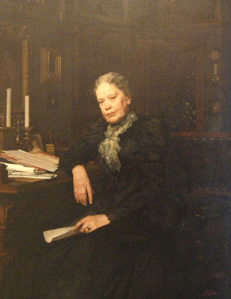
Marie von Ebner-Eschenbach (13 september 1830 - 12 maart 1916)
Portret door Julius Schmidt, 189
Zie voor nog meer schrijvers van de 13e september ook mijn blog van 13 september 2015 deel 1 en ook deel 2.
13-09-2016 om 00:00
geschreven door Romenu 
Tags:Dolce far niente, Novalis, Tõnu Õnnepalu, Roald Dahl, Janusz Glowacki, Jac. van Looy, Nicolaas Beets, Marie von Ebner-Eschenbach
|

